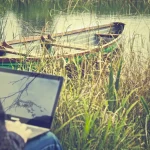
September 16, 2020 – Will Croatia be one of the first countries to introduce a digital nomad visa? A closer look into what this means for the country.
Vecernji List reports that digital nomads are people that work online, and all they really need is a high-speed internet connection. Thus, they can have a temporary office on the beach, in a cafe, on a train, in a park, or wherever the internet is fast and accessible enough. For this reason, digital nomads like to switch up the places and countries they work, because they are their own employer or are almost never obliged to meet their employers. They are mostly IT experts, writers, journalists, designers, or various creatives, and there are more and more jobs that can be done remotely due to technological advances and the development of online tools. Soon, digital nomads could become frequent Croatian guests, and Croatia could be one of the few countries in the world that will regulate the status of digital nomads and issue them a digital nomad visa.
The first step has been taken, the institute of digital nomads has been included in the proposal of the Foreigners Act, which had its first reading in Parliament on Friday, and should be debated and adopted by the end of the year and come into force at the beginning of 2021.
Credit is due to Dutch entrepreneur Jan De Jong, who is mostly responsible for bringing digital nomads to the attention of Croatian legislation. Namely, when asked what Croatia should do to improve its revenues, help Croatian companies survive, and make Croatia a year-round destination, not just a temporary visit for tourists in the three summer months, Jan answered that Croatia needs to regulate the rules on digital nomads, create a digital nomad visa, and open up the country to the world.
“Unfortunately, we have seen that many Croats leave Croatia solely for economic reasons. They didn’t leave because they did not like the lifestyle in Croatia. Who wouldn’t want to live in Croatia if you could live here on a German, Austrian, Swiss or Dutch salary? And that’s where I see a big new industry emerging in Croatia – digital nomad tourism,” wrote Jan De Jong and listed the advantages of Croatia, such as EU membership, great lifestyle, good internet, amazing climate, security, and affordable private health care.
Jan De Jong is interesting from several angles and has been on the Zagreb – Split route living his Croatian dream for almost 14 years. He arrived from the Netherlands to study and stayed. He started a business, successfully sold it, started a new one, and is just about to start another. But this time, we won’t tell you the story of Jan, his companies, his family, and business plans. This is the story of his mission to push Croatia in the direction that unites tourism and work, and of course, consequently generates additional revenues for the state and the economy.
Jan De Jong did not invent digital nomads, the nomad trend strengthened even before the corona crisis, but what he did was openly send a letter to Croatian Prime Minister Andrej Plenkovic on his Linkedin profile, urging him to address the issue of digital nomads and Croatia’s position on that map. The Prime Minister reacted, invited him for an interview, listened to and acknowledged him, and enabled him to explain his initiative to the authorities in the Ministry of the Interior, the Ministry of Tourism, the Ministry of Labor, and the Ministry of Finance. In his open letter, Jan very simply explained why the digital nomad visa is needed.
“Imagine, give these digital nomads the right to come and work from Croatia to the maximum. Twelve months – regardless of citizenship according to the digital nomad visa. Many apartments that are empty out of season could find new tenants. The salaries that digital nomads earn will be spent in Croatia, resulting in a huge boost to our economy through consumption. If we open Croatia to tourists, why not open this country to highly paid digital nomads?” he wrote to the Prime Minister.
Namely, considering his own experience of living and working in Croatia, the development of technology, and the conditions of the corona crisis, Jan De Jong considers Croatia an ideal destination for work, for all those who can work remotely. The result of the first post, which highlights Croatia’s advantages, achieved an impressive 300,000+ views, more than 4,000 likes, and a series of messages from people from all over the world, who are seriously considering temporarily moving to Croatia. The main question in the messages was how to run it and defining the conditions that need to be met. A wheel that would enable digital nomadism to be regulated in Croatia has been launched. As Jan De Jong said, he will have a meeting with the Minister of Finance and more concrete talks on models and solutions for digital nomadism in Croatia.
According to his estimate, by the end of the year, we could have a complete model on the table. However, property census, taxes, health care, insurance, accommodation, and residence needs to be resolved. When we talk about digital nomads, in a broader sense of the word, we are talking about those who need only an office and the Internet to work. In the corona crisis, digital nomads also became everyone who moved work in the office to their permanent place of residence, or, for example, to their parent’s home or a holiday house. The story is simple when it comes to the migration of people within their own country, but it is a bit more complicated if we talk about residents of European Union countries and the wider European economic area who work remotely, change countries, and rent a house or apartment for an extended period in Croatia.
However, digital nomadism is greatly complicated when we talk about third-country nationals who would like to spend a long time, such as a year, in Croatia, and work for Google, Facebook, or another foreign company or are freelancers.
The first step, therefore, has been taken, and that is that the Government has passed a proposal for the Foreigners Act, which also includes the term digital nomads when it comes to a residence in Croatia for residents of third countries. The current law does not allow third-country nationals to move to Croatia temporarily, for a longer period of time. To begin with, they need a visa, and when it is granted, it is usually issued for a maximum of three months, and even then it is only a tourist visa, which means that legally, they should not even work in that period.
The new bill would allow digital nomads to work during those three months, and their temporary stay can last a maximum of 12 months, with the proviso that they can request it again only after six months of living abroad. For now, the property census has not been determined, and it is only certain that it will be higher than the one prescribed for, for example, family reunification or other reasons why third-country residents apply for long-term work or residence visas.
However, this part, as well as a number of other parameters that should be regulated such as taxes and insurance, should be adopted separately, by Government decree. As Jan De Jong said, a kind of working group, composed of representatives of the ministries, have started working, and so far, they have been informed about the various forms for countries like Estonia and their regulations. De Jong believes that we should look at Croatia’s comparative advantages, that is, how Croatia can be more competitive. For example, who would be a good consumer in Croatia and with what salary, should be discussed.
Digital nomads could become a new revenue-generating trend, especially when it comes to younger age groups, those without families and school children, but perhaps also families who tend to move their lives from destination to destination. It was the corona crisis that pointed to these opportunities, and it seems that the Croatian Prime Minister, at least judging by the reaction on social media after meeting with Jan De Jong, saw an opportunity for Croatia, and said that Croatia would be among the first in the world to introduce a digital nomad visa. The idea of digital nomadism and remote work that would be an additional lure for tourists to come and spend in Croatia has already been embraced and is actively considered in some cities, such as Dubrovnik.
Mayor Mate Frankovic said that they are preparing a lot for this part of tourism. He will soon hold a conference in partnership with Saltwater Workspace and Total Croatia News on the topic of digital nomads, and they already have projects and spaces ready that would be suitable for nomads, from accommodation to coworking spaces. He especially praised his cooperation with one telecommunications company on high-speed internet, because high-speed internet, according to Frankovic, is a very important precondition for attracting these hybrid guest workers.
For the latest travel info, bookmark our main travel info article, which is updated daily.
Read the Croatian Travel Update in your language – now available in 24 languages
Join the Total Croatia Travel INFO Viber community.











